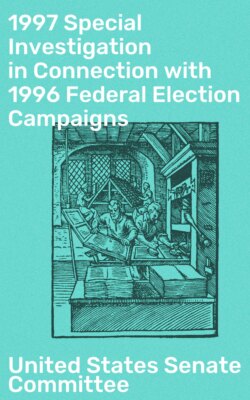Читать книгу 1997 Special Investigation in Connection with 1996 Federal Election Campaigns - United States Senate Committee - Страница 18
На сайте Литреса книга снята с продажи.
The White House and the Presidency Itself Became Fundraising Tools
ОглавлениеTable of Contents
The White-House inspired DNC drive for new sources of campaign cash caused more than just an unprecedented influx of foreign money into the 1996 campaign. More broadly, it debased the White House and the Presidency itself by employing both in constant efforts to raise money. Extensive DNC fundraising occurred because the President and his advisors, including Dick Morris, decided that the party’s massive advertising campaign would cost more than could possibly be provided by the “hard” money in the President’s “official” campaign treasury. To fill the gap, they turned to unregulated “soft” money even though such monies could not by law be used to help a candidate’s campaign for office. Unlike official “campaign” contributions, however, DNC “soft” money could be raised from wealthy donors in unlimited quantities. By diverting DNC funds to campaign advertising controlled by the White House, the Democrats had the best of all possible worlds: de facto “hard” money from key donors in unlimited quantities.
Senior White House and DNC staff developed new ways to use the Presidency to raise campaign money. Among the favors merchandised were access to senior decision makers, perks such as “overnights” at the White House, Presidential coffees at the White House (even in the Oval Office), flights on Air Force One, seats in the President’s box at Kennedy Center, and use of the White House pool and tennis courts.
In this stampede to use the White House for every conceivable variety of fundraiser, a number of alarmingly unsavory characters gained access to the President in return for campaign contributions. One was Chinese arms dealer Wang Jun. Roger Tamraz, a major DNC donor, was allowed to meet with the President on several occasions despite the NSC’s opposition and clear warnings that Tamraz might damage U.S. foreign policy interests in Central Asia. As noted, Ted Sioeng, a foreign national with suspiciously close ties to the Chinese government, sat at the head table with the President or Vice President at several fundraisers and lunched with Vice President Gore at the Hsi Lai Temple.
